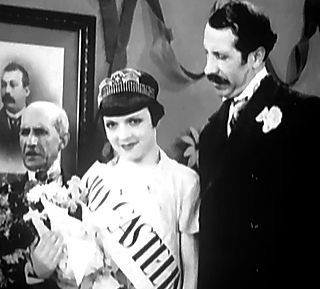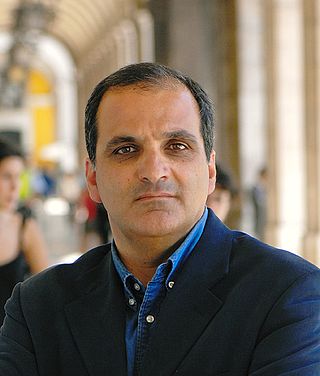
Tobis Portuguesa is a Portuguese film production and lab processing company. Established in June 3, 1932, Tobis produced many of the major works in Portuguese cinema for three decades. [1]

Tobis Portuguesa is a Portuguese film production and lab processing company. Established in June 3, 1932, Tobis produced many of the major works in Portuguese cinema for three decades. [1]
Founded in 1932, Tobis originally focused on film production and lab processing. It produced many works of the 1930s, 1940s and 1950s, such as A Canção de Lisboa and O Leão da Estrela .
In 1955, Tobis merged with Lisboa Filmes, [2] one of Portugal's main film producers. The rights to its films were included within the Tobis film catalogue.
In 2004, Tobis acquired digital video transcription equipment. In 2005, Tobis acquired Concept Films.

Rádio e Televisão de Portugal (RTP) is the public service broadcasting organisation of Portugal. It operates four national television channels and three national radio stations, as well as several satellite and cable offerings.
António Cohen da Cunha Telles was a Portuguese film director and producer.
Jorge Brum do Canto was a Portuguese film director and actor. His career spanned over a half-century, from 1929 to 1984.

Arthur Duarte (1895–1982) was a Portuguese actor, screenwriter, production designer and film director.

The Cinema of Portugal started with the birth of the medium in the late 19th century. Cinema was introduced in Portugal in 1896 with the screening of foreign films and the first Portuguese film was Saída do Pessoal Operário da Fábrica Confiança, made in the same year. The first movie theater opened in 1904 and the first scripted Portuguese film was O Rapto de Uma Actriz (1907). The first all-talking sound film, A Severa, was made in 1931. Starting in 1933, with A Canção de Lisboa, the Golden Age would last the next two decades, with films such as O Pátio das Cantigas (1942) and A Menina da Rádio (1944). Aniki-Bóbó (1942), Manoel de Oliveira's first feature film, marked a milestone, with a realist style predating Italian neorealism by a few years. In the 1950s the industry stagnated. The early 1960s saw the birth of the Cinema Novo movement, showing realism in film, in the vein of Italian neorealism and the French New Wave, with films like Dom Roberto (1962) and Os Verdes Anos (1963). The movement became particularly relevant after the Carnation Revolution of 1974. In 1989, João César Monteiro's Recordações da Casa Amarela won the Silver Lion at the Venice Film Festival and in 2009, João Salaviza's Arena won the Short Film Palme d'Or at the Cannes Film Festival. Several other Portuguese films have been in competition for major film awards like the Palme d'Or and the Golden Bear. João Sete Sete (2006) was the first Portuguese animated feature film. Portuguese cinema is significantly supported by the State, with the government's Instituto do Cinema e do Audiovisual giving films financial support.

A Canção de Lisboa is a 1933 Portuguese musical comedy film, directed by José Cottinelli Telmo, and starring Vasco Santana, Beatriz Costa, António Silva, Alfredo Silva, Ana Maria, Artur Rodrigues, Coralia Escobar, Eduardo Fernandes, Elvira Coutinho, Fernanda Campos, Francisco Costa, Henrique Alves, Ivone Fernandes, José Victor, Júlia da Assunção, Manoel de Oliveira, Manuel Santos Carvalho, Maria Albertina, Maria da Luz, Silvestre Alegrim, Sofia Santos, Teresa Gomes and Zizi Cosme.

Comédia à portuguesa is a term conventionally used to refer to the genre of popular Portuguese film comedies made in the 1930s and 1940s. The light-hearted comedies are predominantly set in petit-bourgeois milieus in traditional Lisbon neighbourhoods and are often accompanied by musical performances, mainly light music, fados or folk songs. The popular revue, the national equivalent of the North American vaudeville or the British music hall, had a marked influence over the comédia à portuguesa, including the talents of the actors, writers, and musicians.

António Maria da Silva was a Portuguese actor. He appeared in more than 40 productions over his more than 50 years in acting.

Luís Filipe Valente Lá Féria Orta, known professionally as Filipe La Féria, is a Portuguese director, producer, and screenwriter for television and theatre.

Walter Rossa is architect, urban planner, researcher and Professor of University of Coimbra.
Portugal was represented at the Eurovision Song Contest 1964 with the song "Oração", composed by João Nobre, with lyrics by Francisco Nicholson and Rogério Bracinha, and performed by António Calvário. The Portuguese participating broadcaster, Radiotelevisão Portuguesa (RTP), selected its entry for the contest at the Grande Prémio TV da Canção Portuguesa 1964. This was the first-ever entry from Portugal in the Eurovision Song Contest, and the first-ever entry performed in Portuguese in the contest.
Portugal was represented at the Eurovision Song Contest 1968 with the song "Verão", composed by Pedro Vaz Osório, with lyrics by José Alberto Diogo, and performed by Carlos Mendes. The Portuguese participating broadcaster, Radiotelevisão Portuguesa (RTP), selected its entry at the Grande Prémio TV da Canção Portuguesa 1968.
Portugal was represented at the Eurovision Song Contest 1971 with the song "Menina do alto da serra", composed by Nuno Nazareth Fernandes, with lyrics by Ary dos Santos, and performed by Tonicha. The Portuguese participating broadcaster, Radiotelevisão Portuguesa (RTP), selected its entry at the Grande Prémio TV da Canção Portuguesa 1971.

Tiago Emanuel da Silva Miranda, known professionally as Conan Osíris, is a Portuguese singer-songwriter. His stage name is based on the main character from Japanese series Future Boy Conan and the ancient Egyptian god Osiris.

Laura Alves was a Portuguese actress on stage, film and radio.
Cecilia Guimarães was a Portuguese actress.
Monique Rutler is a French-Portuguese director, screenwriter and film editor.

Nuno Miguel Cândido Gonçalves, better known as Nuno Gonçalves, is a Portuguese musician, composer and pianist-keyboardist, founder and band member of the Portuguese band The Gift. Some of the band's biggest hits were created by him, including Music, Driving You Slow, Fácil de Entender, Primavera and Clássico.
O Leão da Estrela is a Portuguese comedy film of 1947, starring António Silva, Milú, Maria Eugénia, Laura Alves, Tony D'Algy, Fernando Curado Ribeiro, Arthur Agostinho, Maria Olguim, Cremilda de Oliveira, Óscar Acúrcio, and Erico Braga, and directed by Arthur Duarte. It is a classic of the Portuguese cinema. In its remake of 2015, the main character is played by Miguel Guilherme.

Casa Guilhermina is the seventh studio album by Ana Moura. Released on 11 November 2022, the album topped the national sales chart and was named as one of the albums of the year by various reputable Portuguese publications.